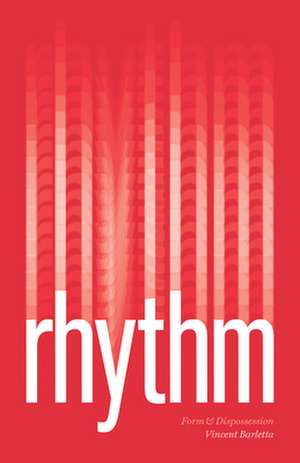Rhythm: Form and Dispossession
Autor Professor Vincent Barlettaen Limba Engleză Hardback – 22 mar 2020
More than the persistent beat of a song or the structural frame of poetry, rhythm is a deeply imbedded force that drives our world and is also a central component of the condition of human existence. It’s the pulse of the body, a power that orders matter, a strange and natural force that flows through us. Virginia Woolf describes it as a “wave in the mind” that carries us, something we can no more escape than we could stop our hearts from beating.
Vincent Barletta explores rhythm through three historical moments, each addressing it as a phenomenon that transcends poetry, aesthetics, and even temporality. He reveals rhythm to be a power that holds us in place, dispossesses us, and shapes the foundations of our world. In these moments, Barletta encounters rhythm as a primordial and physical binding force that establishes order and form in the ancient world, as the anatomy of lived experience in early modern Europe, and as a subject of aesthetic and ethical questioning in the twentieth century.
A wide-ranging book covering a period spanning two millennia and texts from over ten languages, Rhythm will expand the conversation around this complex and powerful phenomenon.
Vincent Barletta explores rhythm through three historical moments, each addressing it as a phenomenon that transcends poetry, aesthetics, and even temporality. He reveals rhythm to be a power that holds us in place, dispossesses us, and shapes the foundations of our world. In these moments, Barletta encounters rhythm as a primordial and physical binding force that establishes order and form in the ancient world, as the anatomy of lived experience in early modern Europe, and as a subject of aesthetic and ethical questioning in the twentieth century.
A wide-ranging book covering a period spanning two millennia and texts from over ten languages, Rhythm will expand the conversation around this complex and powerful phenomenon.
Preț: 391.19 lei
Preț vechi: 499.31 lei
-22% Nou
Puncte Express: 587
Preț estimativ în valută:
74.86€ • 77.34$ • 62.31£
74.86€ • 77.34$ • 62.31£
Carte indisponibilă temporar
Doresc să fiu notificat când acest titlu va fi disponibil:
Se trimite...
Preluare comenzi: 021 569.72.76
Specificații
ISBN-13: 9780226685731
ISBN-10: 022668573X
Pagini: 216
Dimensiuni: 140 x 216 x 20 mm
Greutate: 0.4 kg
Ediția:First Edition
Editura: University of Chicago Press
Colecția University of Chicago Press
ISBN-10: 022668573X
Pagini: 216
Dimensiuni: 140 x 216 x 20 mm
Greutate: 0.4 kg
Ediția:First Edition
Editura: University of Chicago Press
Colecția University of Chicago Press
Notă biografică
Vincent Barletta is associate professor of comparative literature and Iberian and Latin American cultures at Stanford University. He is the author of Death in Babylon: Alexander the Great and Iberian Empire in the Muslim Orient and Covert Gestures: Crypto-Islamic Literature as Cultural Practice in Early Modern Spain.
Cuprins
Preface
1. Rivers Stopped or Flowing Backward
2. Harmony, Number, and Others
3. Twentieth-Century Measures
Conclusions
Acknowledgments
Notes
Bibliography
Index
Notes
Bibliography
Index
Recenzii
“Rhythm is an original and masterfully researched intervention in the study of rhythm and, more broadly, literature. Starting from the ancient Greeks and ending with Emmanuel Levinas, Barletta brings together an impressive number of authors and texts from over two millennia, offering a fresh reading of what we mean when we say ‘rhythm.’ He breaks apart narrow definitions of this idea, opening new pathways by which to think about rhythm ethically. This book testifies to Barletta’s astounding command of languages, literatures, poetics, and philology and yields an entirely new vision of what rhythm is and can be."
"Barletta offers a well-written, thoughtful, and original contribution to thinking on rhythm and poetic form. With its broad and speculative approach to the very concept of rhythm, this is a singular contribution to the field. Barletta asks us to reconsider our existing paradigms of rhythm by turning away from time-based models and toward a notion that emerges in pre-Socratic atomist thought, a fundamental sense of rhythm, ruthmós, as a force ‘that holds us all.’”
